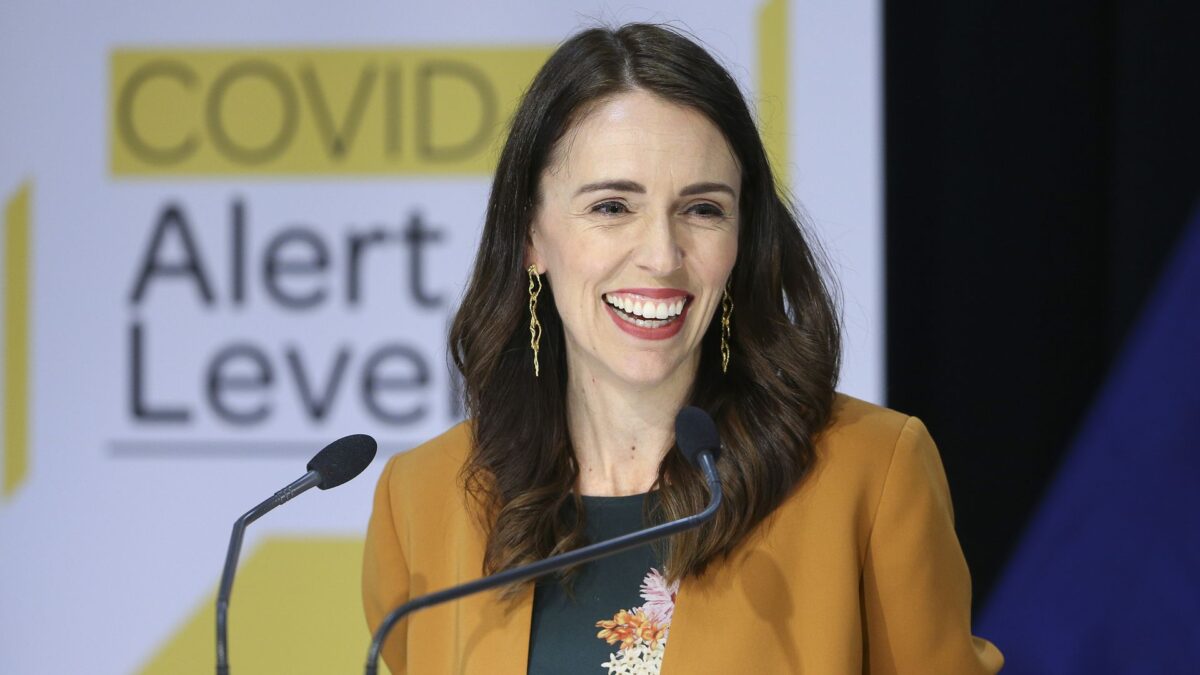Photo courtesy of Getty Images.
It’s no wonder that Jacinda Ardern, the Prime Minister of New Zealand, is the leader that everybody wants. In the spring of 2020, her swift, calculated, and—most importantly—transparent measures eradicated the coronavirus from the island nation. While the rest of the world buckled from rising case numbers, positivity rates, and deaths, forcing many countries to lock down well into the summer, New Zealand was easing its way to a return to normal. Indeed, Prime Minister Ardern’s government became the gold standard for handling a global crisis.
Ardern was born in 1980 in Hamilton, New Zealand. She spent her early years in the small town of Murupara, located on New Zealand’s North Island. It was here, in fact, that Ardern started developing a view of the world that would prove influential in her political aspirations. Murupara was known to many as the central hub of Māori gang activity, and Ardern often saw children running around without shoes and food to eat.
Years before completing her communication studies degree at the University of Waikato in 1999, Ardern officially joined the Labour Party at the young age of 17. Ardern’s social awareness and progressive ideas began to emerge in her twenties when she decided to leave the church due to its opposition to same-sex marriage. ‘I’m either doing a disservice to the church or my friends,’ shared Ardern in a New Zealand interview.
In 2001, as a recent graduate Ardern scored a researcher position for Labour MP Phil Goff. This role proved to be pivotal as it eventually led her to become a staff member for then Prime Minister Helen Clark. Incidentally, Clark was the second woman ever to be the country’s head of government who became Ardern’s personal hero and mentor. Years later, in an interview regarding COVID-19, Clarke praised Ardern, stating,” This is the kind of crisis which will make or break leaders. And this will make Jacinda.”
Eventually, in 2008, Ardern would find herself chosen as the Labour Party’s candidate for MP in the Waikato district. Though she lost the seat by a small percentage of votes, New Zealand’s mixed member proportional (MMP) election system placed her on a list of candidates for MP, from which members would be chosen in relation to the party’s votes. As a result, at the age of 28, Ardern became the youngest MP to enter the House of Representatives.
Right from the start of her political career, Ardern barrelled through with policy changes and political achievements. From championing the inclusion of compulsory education in the Māori language in schools and criticizing the government’s lack of action against climate change to becoming the Labour Party’s spokesperson for Arts, Culture, Heritage, Children, Justice, and Small Business (to name a few), Ardern quickly climbed the ranks of her party and gained prominence for her forward-thinking approach to the welfare of her constituents.
The year 2017 would mark a special milestone for Ardern. In March, she was elected deputy leader of the Labour Party. Five months later, she became Leader. And then, in the September general election the same year, Ardern was elected Prime Minister, making her the third woman in the country to hold the title, the youngest Prime Minister the country had seen in 150 years, and the youngest woman in the world (at age 37) to be the head of a country’s government. Her platform centred on New Zealand’s housing crisis, child poverty, and social inequality, all of which were key issues for the general public.
Ardern’s refreshing take on governmental leadership thrust her into the global spotlight. She became a beacon of hope, particularly for younger generations throughout the world who otherwise felt jaded by the selfishness and callousness of their respective governments. “We aspire to be a government for all New Zealanders, and one that will seize the opportunity to build a fairer, better New Zealand,” she pledged during her campaign.
What’s most interesting is that Ardern was, at first, reluctant to be the Labour Party’s leader, so much so that she declined the party’s leadership seven times before finally acquiescing. For Ardern, being the Minister of Children was her ultimate political goal. Outside of work, she wanted a family, a quiet life, and the satisfaction of knowing that her work helped other children and families. Ardern describes herself as a social democrat and a progressive, which is a stark contrast to the political alignment of the National Party—the Labour Party’s main opposition and, before Ardern’s entry, the country’s leading party. Yet, her socially progressive perspective on the state of the country and world at large is what made the public fall in love with her.
During her first few years as Prime Minister, Ardern effectively became a leader for the people. In February 2018, she became New Zealand’s first PM to march in a Pride parade. Later, in June, she became the first woman state leader to have a baby while in office. Ardern continues to set new norms for governmental leaders when she gave birth and only took a six-week maternity leave, sharing that her partner will be a stay-at-home dad. In March, the following year, she swiftly imposed strict gun laws after the mosque shootings in Christchurch. Then, in December, she led the country in mourning after a devastating volcanic eruption on Whakaari claimed the lives of over a dozen people.
Incidentally, before the American Presidential election in 2020, Ardern was dubbed “the anti-Trump,” garnering her a reputation on the global stage as one of the few world leaders to care for their country’s people and to push forward with equal and equitable change. She is a witty, humble, and compassionate leader, which is why people genuinely love her: she represents a minority of people in leadership positions who aren’t self-serving, deceitful, and uncaring.
Where other politicians see votes, Ardern sees people with individual stories and lives. Where others see power, she sees the responsibility of enacting change for the better. And that’s why she’s the epitome of a modern utopian leader: despite climbing to the top, despite claiming the highest seat in her country, and despite acquiring global fame and recognition, she never stopped being the small-town citizen who looked at the children running around without shoes and knew that she needed to do something to help them.
Jericho Tadeo | Contributing Writer




















